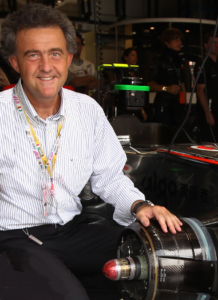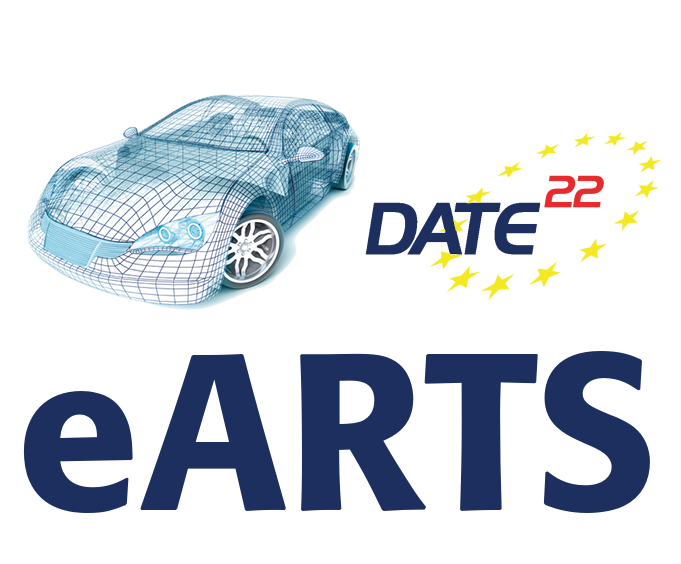Morning sessions |
|
|---|---|
| 8:30 – 8:40 CET | Opening |
| 8:40 – 9:40 CET | Keynote: From combustion towards electrical cars |
| 9:40 – 10:00 CET | Break |
| 10:00 – 11:00 CET | Technical Session 1: Applications, Machine Learning and System-level Test |
| 11:00 – 12:00 CET | Special Session 1: Design-for-dependability for AI hardware accelerators in the edge |
| 12:00 – 13:00 CET | Technical Session 2: Testing |
| 13:00 – 14:30 CET | Lunch break |
Afternoon sessions |
|
|---|---|
| 14:30 – 15:30 CET | Technical Session 3: Reliability and Safety |
| 15:30 – 16:10 CET | Embedded Tutorial: IEEE P2851 advancements |
| 16:10 – 16:30 CET | Break |
| 16:30 – 17:30 CET | Special Session 2: The challenges of reaching zero defect and functional safety – and how the EDA industry tackles them |
| 17:30 – 18:30 CET | Panel: What are the limitations of EDA tools with respect to zero defects and FuSa? |
| 18:30 – 18:45 CET | Closing |
8:30-8:40 CET – Opening
Chairs:
- Paolo Bernardi (Politecnico di Torino)
- Yervant Zorian (Synopsys)
- Riccardo Cantoro (Politecnico di Torino)
- Wim Dobbelaere (onsemi)
8:40-9:40 CET – Keynote: From combustion towards electrical cars
Moderator: Paolo Bernardi (Politecnico di Torino)

Speaker: Riccardo Groppo (Ideas & Motion)
Short bio: Riccardo Groppo took his MSc degree in Electronic Engineering at the Politecnico of Torino (Torino, Italy). He is the co-founder and CEO of Ideas & Motion, a high-tech company focused on IP development on silicon and design of complex automotive control systems for niche applications. He is the Chairman of Transportation Working Group and Board Vice-Chairman within EPoSS (European Platform on Smart Systems Integration). He is Member of the Technical Committee in some relevant events worldwide (SAE World Congress, AMAA Conference and Smart System Integration Conference). He started his career with Honeywell Bull and then joined Centro Ricerche FIAT (CRF) in 1989, where he was involved in the design of innovative engine/vehicle automotive control systems. He was a member of the CRF team who developed the first automotive Common Rail system for a direct injection Diesel engine. Then he was involved in the design and industrialization of the MultiAir Technology and the Dry Dual Clutch transmission. He has been the Head of the Automotive Electronics Design and Development Dept. at CRF (2002-2013), where he promoted the design of IP building blocks by means of ASIC technology in cooperation with Freescale Semiconductors and Robert BOSCH for the FIAT/Chrysler applications. Those smart drivers are the standard de-facto in automotive powertrain applications, with volumes exceeding 17 Million parts/year. He holds more 31 patents in the field of automotive electronics and embedded systems, most of which are currently in production on passenger cars.
10:00-11:00 CET – Technical Session 1: Applications, Machine Learning and System-level Test
Moderator: Paolo Rech (University of Trento)
Presentations:
- Towards Fast and Efficient Scenario Generation For Autonomous Vehicles
Haolan Liu (University of California San Diego); Hengyu Zhao (University of California San Diego); Siva Kumar Sastry Hari (NVIDIA); Jishen Zhao (University of California San Diego) - Deep Learning Based Driver Model and Fault Detection for Automated Racecar System Testing
Yousef Abdulhammed (BMW Motorsport); Christoph Schaefer (BMW Motorsport); Mikail Yayla (Technical University of Dortmund); Ching-Chi Lin (TU Dortmund); Jian-Jia Chen (TU Dortmund) - Unsupervised Clustering of Acoustic Emission Signals for Semiconductor Thin Layer Crack Detection and Damage Event Interpretation
Sarah Seifi (Infineon Technologies AG); Marianne Unterreitmeier (Infineon Technologies AG); Oliver Nagler (Infineon Technologies AG) - Online scheduling of Memory BISTs execution at Real-Time Operating-System level
Francesco Angione (Politecnico Di Torino); Paolo Bernardi (Politecnico di Torino); Gabriele Filipponi (Politecnico di Torino); Matteo Sonza Reorda (Politecnico di Torino – DAUIN); Claudia Tempesta (Politecnico di Torino); Davide Appello (STMicroelectronics); Vincenzo Tancorre (STMicroelectronics); Roberto Ugioli (STMicroelectronics)
11:00-12:00 CET – Special Session 1: Design-for-dependability for AI hardware accelerators in the edge
Organizer: Haralampos Stratigopoulos
Moderator: Marcello Traiola (Inria)
Abstract: AI has seen an explosion in real-world applications in the recent years. For example, it is the backbone of self-driving and connected cars. The design of AI hardware accelerators to support the intensive and memory-hungry AI workloads is an on-going effort aiming at optimizing the energy-area trade-off. This special session will focus on dependability aspects in the design of AI hardware accelerators. It is often tacitly assumed that neural networks on hardware inherit the remarkable fault tolerance capabilities of the biological brain. This assumption has proven to be false in recent years by a number of fault injection experiments. The three talks will cover reliability assessment and fault tolerance of Artificial Neural Networks and Spiking Neural Networks implemented in hardware, as well as the impact of approximate computing on the fault tolerance capabilities.
Presentations:
- Fault Tolerance of Neural Network Hardware Accelerators for Autonomous Driving
Adrian Evans (CEA-LETI, Grenoble, France), Lorena Anghel (Grenoble-INP, SPINTEC, Grenoble, France), and Stéphane Burel (CEA-LETI, Grenoble, France) - Exploiting Approximate Computing for Efficient and Reliable Convolutional Neural Networks
Alberto Bosio (École Centrale de Lyon, INL, Lyon, France) - Reliability Assessment and Fault Tolerance of Spiking Neural Network Hardware Accelerators
Haralampos-G. Stratigopoulos (Sorbonne University, CNRS, LIP6, Paris, France)
12:00-13:00 CET – Technical Session 2: Testing
Moderator: Melanie Schillinsky (NXP)
Presentations:
- Perception and Reality Check into V-Stress for Screening Defective Parts in Automotive Reliability
Lieyi Sheng (onsemi); Wei Pan (onsemi) - Power Cycling Body Diode Current Flow on SiC MOSFET Device
Giovanni Corrente (STMicroelectronics Srl); Sebastiana Bentivegna (STMicroelectronics Srl); Sebastiano Russo (STMicroelectronics Srl) - Reducing Routing Overhead using Natural Loops
Tobias Kilian (TU Munich / Infineon Technologies AG); Daniel Tille (Infineon Technologies); Martin Huch (Infineon Technologies); Ulf Schlichtmann (Technical University of Munich) - A Novel Method for Discovering Electrically Equivalent Defects in Analog/Mixed-Signal Circuits
Huiping Huang (Synopsys Inc.); Mayukh Bhattacharya (Synopsys)
14:30-15:30 CET – Technical Session 3: Reliability and Safety
Moderator: Michelangelo Grosso (STMicroelectronics)
Presentations:
- Improving Instruction Cache Memory Reliability under Real-Time constraints
Fabien Bouquillon (Université de Lille); Giuseppe Lipari (Université de Lille); Smail Niar (Université Polytechnique Hauts-de-France) - Common data language connecting HTOL testing to in-field use
Marc Hutner (proteanTecs); Nir Sever (proteanTecs); Alex Burlak (proteanTecs) - Efficient use of on-line LogicBIST to achieve ASIL B in a GPU IP
Lee Harrison (Siemens EDA); Antonio Priore (Arm) - Verification and Validation of Safety Element out of Context
Shivakumar Chonnad (Synopsys Inc); Vladimir Litovtchenko (Synopsys GmbH)
15:30-16:10 CET – Embedded Tutorial: IEEE P2851 advancements
Organizer: Jyotika Athavale (NVIDIA)
Moderator: Davide Appello (STMicroelectronics)
Speakers:
- Bernhard Bauer (Synopsys, DE)
- Meirav Nitzan (Synopsys, US)
16:30-17:30 CET – Special Session 2: The challenges of reaching zero defect and functional safety – and how the EDA industry tackles them
Organizers: Daniel Tille (Infineon), Riccardo Cantoro (Politecnico di Torino)
Moderator: Riccardo Cantoro (Politecnico di Torino)
Abstract: Automotive Microcontrollers have been becoming very complex System-on-Chips (SoCs). Especially the megatrends Assisted Driving (ADAS) and Automated Driving (AD), but also traditional applications such as power-train steering require ever-increasing functionality. However, these safety-critical environments require zero defect, and the implementation of functional safety measures and the rising complexity poses significant challenges to satisfy these requirements. This special session addresses these challenges and shows potential solutions to overcome them with the help of the EDA industry.
Presentations:
- Automated solutions for safety and security vulnerabilities
Teo Cupaiuolo (Synopsys) - Functional Safety: an EDA perspective
Alessandra Nardi (Cadence) - The Zero Defect Goal For Automotive ICs
Lee Harrison, Nilanjan Mukherjee (Siemens)
17:30-18:30 CET – Panel: What are the limitations of EDA tools with respect to zero defects and FuSa?
Organizer: Davide Appello (STMicroelectronics)
Moderator: Wim Dobbelaere (onsemi)
Abstract: High quality demanding products segments like automotive, transportation, and aerospace have been characterized by persistent needs across several years:
– Zero defects, or in general very low defective levels
– Accurate modeling and prediction of product reliability
The sustainability of these objectives is challenged by the relentless demand of higher performances products and the consequent access to higher complexities and advanced technology nodes.
Functional safety standards and requirements aim to grant the usability of products in safety-critical applications and add several requirements whose satisfaction is a key criticality during the development of a new product.
The proposed panel session would like to debate with the experts about how much the available EDA tools are effectively helping to face the described challenges.
As an example, these are suitable questions that anyone in the field may need answering:
– How does EDA help effectively resolve “end-to-end” the traceability of defined requirements? Is this representing a sustainable effort?
– Is DFT effective enough in addressing fault models to reach target quality?
– Is verification/simulation/validation effective respect transient mode?
Panelists:
- Jim Dodrill (ARM)
- Georges Gielen (KU Leuven)
- Chen He (NXP)
- Mauro Pipponzi (ELES)
- Vladimir Zivkivic (Infineon)
- Om Ranjan (STMicroelectronics)
18:30-18:45 CET – Closing
Chairs:
- Paolo Bernardi (Politecnico di Torino)
- Yervant Zorian (Synopsys)
- Riccardo Cantoro (Politecnico di Torino)
- Wim Dobbelaere (onsemi)
